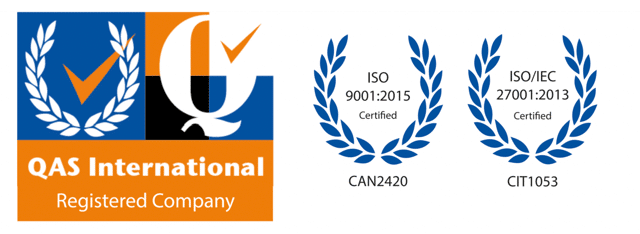Covid-19 changed the workplace for everyone in 2019. As people scrambled to adjust to remote work and all the adjustments that came with it, companies made a lot of mistakes, and procedures needed to be adjusted and changed to fit with the new landscape. This is why ISO certification was so important to Pund-IT. Pund-IT adjusts our procedures to be extremely thorough and update them frequently. By doing so we provide the kind of dependability that our clients need.
What is ISO?
ISO stands for International Organization for Standardization, and the certification establishes credibility and trust. It means that the companies who choose to get certified are meeting global standards for business. The goal is to create high standards for quality control, make compliance and security protocols a priority, and to create the steps required to adhere to them. Here are 6 reasons why you should care about your IT Provider being ISO certified:
1. Higher Quality, Greater Efficiency, Fewer Errors, Less Wasted Time
Several of the Standard’s requirements lead to improvements in operational processes’ efficiency and dependability, both directly and indirectly. Reducing the amount of time required to do a task, waste, and rework depends on the criteria. This affects employee competence, updated documentation, and supplier controls. The process based approach and the raising of Quality of both Products and Services are both core ideas of ISO 9001. They help to integrate operational processes better and more effectively with less opportunity for error.
The 9001 Standard also reduces risk overall. It includes a significant amount of risk-based thinking, and forces companies to examine potential weak spots so they can fix them. In accordance with the Standard, “Risk-based thinking enables an organisation to identify the factors that could cause its processes and its quality management system to deviate from the planned results, to implement preventive controls to reduce unfavourable effects, and to maximise the potential of opportunities as they arise.”
2. Supplier Criteria and Higher Standards for Services
The ISO 9001 Standard mandates that firms seeking certification develop criteria for choosing their suppliers. Although firms are free to set their own standards, there is a growing trend towards companies requiring ISO 9001 accreditation. It’s also important to point out that many government organisations are now requiring ISO 9001 certification in place of their own quality requirements.
Better quality is often associated with — and expected from — businesses that have earned their ISO 9001 certification. In actuality, it is among the foremost advantages of adopting the standard. Higher quality of suppliers means better quality products, and service follows suit.
3. Developing Competitive Advantage
The ISO 27001 accreditation demonstrates that we take preventative measures against threats to information security. It also displays that our business has systems to track and minimize those risks. Additionally, compliance with ISO 27001 is sometimes necessary for access to international markets. It enables us to compete with foreign rivals, and on occasion compliance with ISO 27001 is a crucial admission condition. Compliance with ISO 27001 eliminates the trouble of dealing with auditors and filling out lengthy security questionnaires for each new client and supplier.
Another point of focus for ISO 9001 is customer satisfaction. The guidelines mandate that your customer criteria have been met, but also how your clients feel about it. Because of our well-executed quality management systems, it is practically guaranteed that our customers are satisfied by our services.
4. Avoiding Financial Loss Resulting from a Security Breach
ISO 27001 is widely recognized as the standard for information security of information assets. Because of this adherence to the standard we can assist organizations in avoiding potential severe fines and penalties. It is able to do this because it automatically integrates all other standards, such as Business Continuity Management, IT Service Management, Quality Management, and Environmental Management, the most recent edition of the standard, ISO 27001: 2013, ensures C-level corporate governance.
Because their frameworks are similar, we can adapt a set of integrated procedures based on the standards, saving time and money. More importantly, it is critical to understand that a data breach not only exposes organisational secrets but also costs companies a lot of money. The average total cost of a data breach was calculated to be $3.79 million, according to IBM. There has been a 23% global growth over the previous two years. Preventative measures (ex. in Cybersecurity) save you time, money and headache.
5. Ensuring Data Integrity and Privacy
Most organizations, especially those that handle their client’s personal data, place high importance on maintaining data privacy and integrity. A successful method for ensuring information security management and lowering the risk of data breaches is an information security management system (ISMS). This is how an ISO 27001 implemented company benefits your organization:
Data storage, access control, safe usage, and data destruction are all made possible by ISO 27001. Regular threats to your information are easier to recognize, manage, and lessen in severity thanks to ISO 27001’s systematic methodology. Working with an ISO 27001 compliant business improves the security of your information assets, which lowers the likelihood of facing legal action and losing trust due to data breaches. Our processes demonstrate the ability to quickly identify a security breach incident and take appropriate action. The standard’s access control, data backup, and data organization methods also guarantee data integrity. In the event of a security compromise, we know how to enable the isolation of the impacted data from the remainder and allow for correction.
6. Defining Information and Responsibilities
It is crucial that the companies you deal with specify who will be in charge of making choices. Maintaining information assets, and approving access to information can only be done well when there is accountability and responsibility.
Security extends to our every aspect, including personnel, technology, and operating processes, and it fosters an organisational culture that values information security. Our Senior Management places a high importance on information security, hence we specify and pinpoint the tasks and responsibilities of the ISMS.
Regularly undertaking training and awareness campaigns are also routine for us. It helps to lower employee-related security breaches and with information security. Preventing financial loss brought on by a security breach ensures the integrity and privacy of the data. Finally, it helps us in defining the roles and responsibilities of information handling.
#ISO 9001 #ISO 27001 #ISOCertifiedMSP #QualityControl #Compliance #RiskManagement #IT #MSP #LetsTechAboutIT
Wanting to read more? Check out this blog by our friends at Evergreen!






